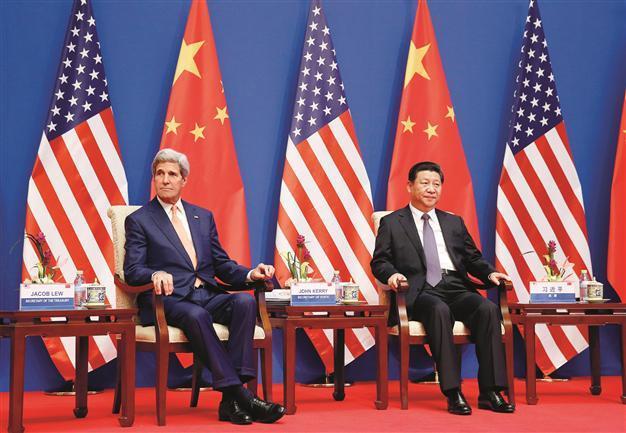China, US vow to end old rivalries in high-level talks
BEIJING - Agence France-Presse

US Secretary of State John Kerry and Chinese President Xi Jinping sit next to each other as they participate in a Joint Opening Session of the US-China Strategic and Economic Dialogue in Beijing.
China and the United States met for high-level talks yesterday, with Chinese President Xi Jinping urging the world’s two biggest economies to break old patterns of confrontation.
Given their different histories and cultures “it is natural that China and the U.S. may have different views and even frictions on certain issues,” Xi told the opening of the two-day annual talks in Beijing.
“This is what makes communication and cooperation even more necessary,” he urged, speaking in the same imposing compound where then-U.S. President Richard Nixon met Mao Zedong on his groundbreaking visit to China in 1972. The sixth Strategic and Economic Dialogue comes as tensions have risen in recent months, racked by maritime disputes between China and its neighbors as well as U.S. fears over cybersecurity and Chinese hacking.
“Our interests are more than ever interconnected,” Xi insisted, saying the two “stand to gain from cooperation and lose from confrontation.”
“If we are in confrontation it will surely spell disaster for both countries and for the world,” he said, adding the Pacific powers needed to “break the old pattern of inevitable confrontation.”
In a statement sent to the opening of the meetings, U.S. President Barack Obama agreed, saying: “The United States and China will not always see eye-to-eye on every issue.” That was “why we need to build our relationship around common challenges, mutual responsibilities, and shared interests, even while we candidly address our differences,” Obama said.
Climate talksObama, who has made the so-called pivot to Asia a focus of his administration, will return to Beijing in November when it hosts a summit of Asia-Pacific leaders. Topping the agenda July 8 were discussions on how to tackle climate change, as the two largest emitters of the greenhouse gases blamed for global warming agreed to launch eight pilot projects aimed at reducing their carbon footprints. “People around the world are demanding action,” U.S. Secretary of State John Kerry told a working group on the issue.
“Climate change respects no borders, no boundaries, and affects the entire planet. For better or worse, we are now aware of the consequences of inaction in ways that we never have before.” U.S. special envoy for climate change Todd Stern said the two sides had had some “constructive” talks before a U.N. meeting in Paris next year due to set new global gas emissions targets for after 2020.
Xie Zhenhua, vice chairman of the National Development and Reform Commission, told reporters that Beijing was working on setting its targets.
China has long argued that it remains a developing country despite its economic clout, and as such should not have to shoulder the same burden for reducing greenhouse gases. Kerry, who is leading Washington’s team with Treasury Secretary Jack Lew, earlier sought to address Chinese concerns that the U.S. was seeking to rein in the country, insisting “the United States does not seek to contain China.”
Kerry will also try to persuade China to reinstate a cybersecurity working group in a bid to draw up rules for using and protecting the Internet.
The new group, which has only met twice, was cancelled by Beijing after the U.S. indicted five Chinese military officers for hacking into U.S. businesses, charges dismissed by China.
